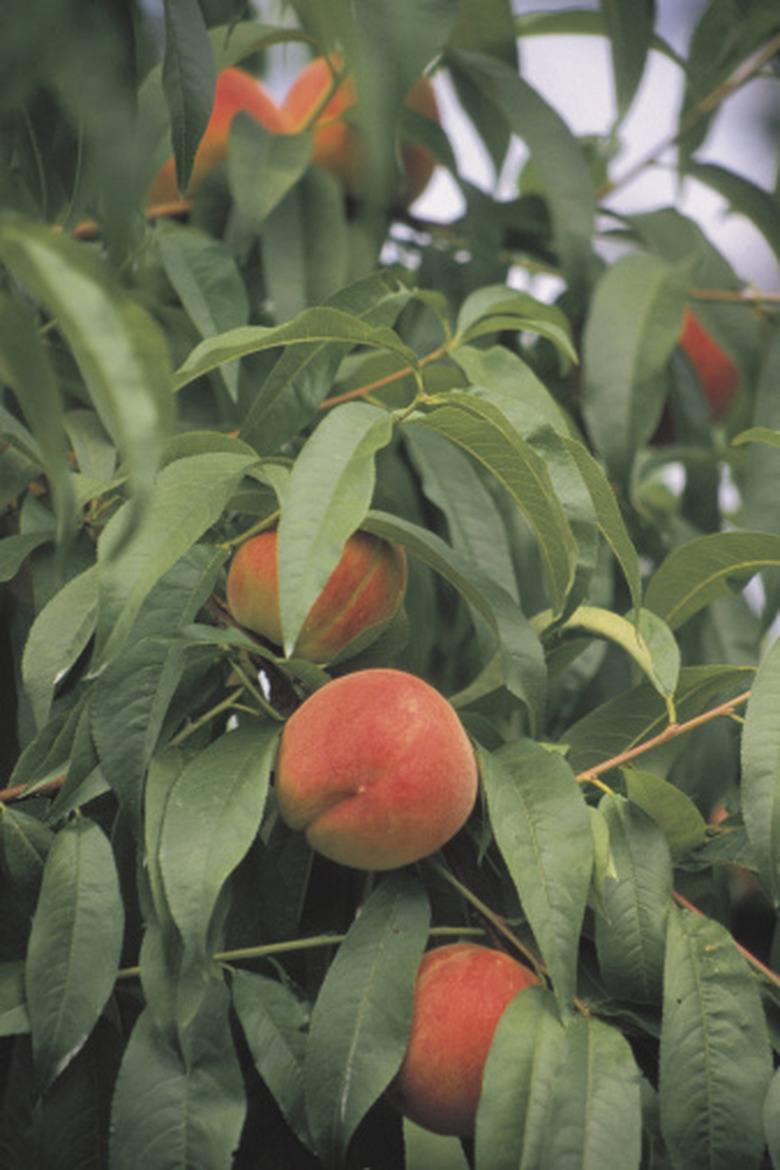How To Organically Care For Peach Tree Insects
Things Needed
- Burlap, heavy paper or plastic mulch
- Knife or wire
- Drop cloth
- Commercial sticky coating
- Horticultural oil
Tip
Avoid petroleum-based horticultural oils by looking for those made with cottonseed or sesame oils. Neem oil is also a suitable organic horticultural oil.
Conventionally grown peaches absorb an enormous amount of pesticides through their soft skin, and are No. 2 on the "Dirty Dozen" list for 2010, a list of crops containing the highest amount of pesticide residue compiled by the Environmental Working Group. The most common insects found on peach trees are scales, harlequin bugs, curculio, spider mites and fruit moth larvae. Using organic pest control methods on your peach trees helps you avoid ingesting potentially harmful chemicals.
Step 1
Stop peach tree borers from laying eggs in the soil at the tree base by laying burlap, heavy paper or plastic mulch. Leave it in place from early spring, before the pests lay their eggs, and throughout the summer. Identify damage caused by peach tree borers by holes and a sticky discharge. Kill individual borers with a knife or by inserting a wire into the hole. Keep trees healthy and vigorous because weak trees attract these insects.
- Conventionally grown peaches absorb an enormous amount of pesticides through their soft skin, and are No.
- Stop peach tree borers from laying eggs in the soil at the tree base by laying burlap, heavy paper or plastic mulch.
Step 2
Inspect the fruit on your peach tree for similar looking scars where curculio beetles have entered and laid eggs in the fruit. To control the curculios, spread a drop cloth at the peach tree's base and firmly bang the tree trunk and branches with a paddle or bat. Destroy the beetles that fall onto the drop cloth. Do this twice a day at the first sight of a scarred fruit. Removing any fallen fruit helps prevents any already laid eggs from hatching.
Step 3
Keep ants off your peach tree by wrapping the tree base with a covering coated in a commercial sticky substance. Ants transport scales, which cling to the bark and suck out the tree's juices. You can prevent scales in the dormant season by applying a horticultural oil.
- Inspect the fruit on your peach tree for similar looking scars where curculio beetles have entered and laid eggs in the fruit.
- Keep ants off your peach tree by wrapping the tree base with a covering coated in a commercial sticky substance.
Step 4
Knock small, red spider mites off your peach tree branches with a strong stream of water from a spray bottle. Heavy infestations will require an insecticidal soap either store-bought or homemade using water and a small amount of non-abrasive dish soap.
Step 5
Identify fruit moths that tunnel into new shoots and cause wilting by slitting the stem below the wilted section and finding pinkish-white caterpillars that are up to a 1/2 inch long. Destroy overwintering larvae by tilling the soil 4 inches deep around young peach trees in early spring, and by planting early-bearing cultivars that are harvested before midsummer. Use pheromone traps to monitor the pests. Pheromone patches disrupt mating pests when applied to the lower limbs of the peach tree.
Step 6
Pull or mow weedy areas near peach trees in order to control harlequin bugs. These peach tree pests overwinter in the weeds where females lay 300 to 500 eggs each. The eggs hatch when the weather warms and the insects feed on the peach trees' sap and fruit, leaving behind scars and dimples. Adding small flowering plants near the peach trees will attract parasitic wasps and flies that will kill the harlequin bugs.
- Knock small, red spider mites off your peach tree branches with a strong stream of water from a spray bottle.
- Adding small flowering plants near the peach trees will attract parasitic wasps and flies that will kill the harlequin bugs.
References
- "The Organic Gardener's Handbook of Natural Pest and Disease Control: A Rodale Organic Gardening Book"; edited by Fern Marshall Bradley, Barbara W. Ellis, Deborah L. Martin; 2009
- "Master Gardener Handbook"; University of Florida IFAS Extension; 2008-2009
- "Natural Insect Control: The Ecological Gardener's Guide to Foiling Pests"; Warren Schultz and Janet Marinelli; 1994
